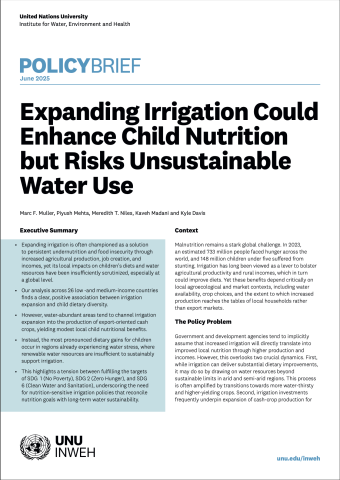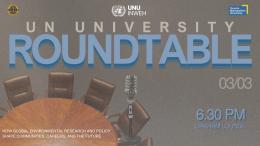UNU-INWEH Policy Brief: Müller, M. F., Mehta, P., Niles, M. T., Madani, K., Davis, K. (2025). Expanding Irrigation Could Enhance Child Nutrition but Risks Unsustainable Water Use. United Nations University Institute for Water, Environment and Health (UNU-INWEH), Richmond Hill, Ontario, Canada. Doi: http://doi.org/10.53328/INR25MMU005
The policy brief also available in Français and Español
DOWNLOAD PDF

A key strategy to fight global hunger and improve livelihoods is often seen to be the expansion of irrigation. However, benefits to local communities are not automatic and are dependent on factors like water availability and the types of crops grown. In this policy brief, the complex links between irrigation, child nutrition, and water sustainability are examined.
Through an analysis of over 70,000 households, a positive link between irrigation and child dietary diversity has been revealed. Strikingly, the most significant dietary improvements for children are found to be in water-stressed regions, where the drawing of more water for agriculture is unsustainable.
In water-abundant areas, nutritional benefits are found to be less pronounced. Here, the cultivation of cash crops for export markets is often supported by irrigation expansion, which may not result in improved local food availability or diets.
A conflict is thereby created between the achievement of hunger, poverty, and water security goals. If irrigation expansion is pursued without careful planning, water resources are at risk of being depleted, and the communities intended to be helped may fail to be nourished.
This policy brief from UNU-INWEH calls for a shift in irrigation expansion policies, emphasizing nutrition-sensitive planning and integrating water sustainability assessments to harmonize development goals and ensure both food and water security for vulnerable populations.



